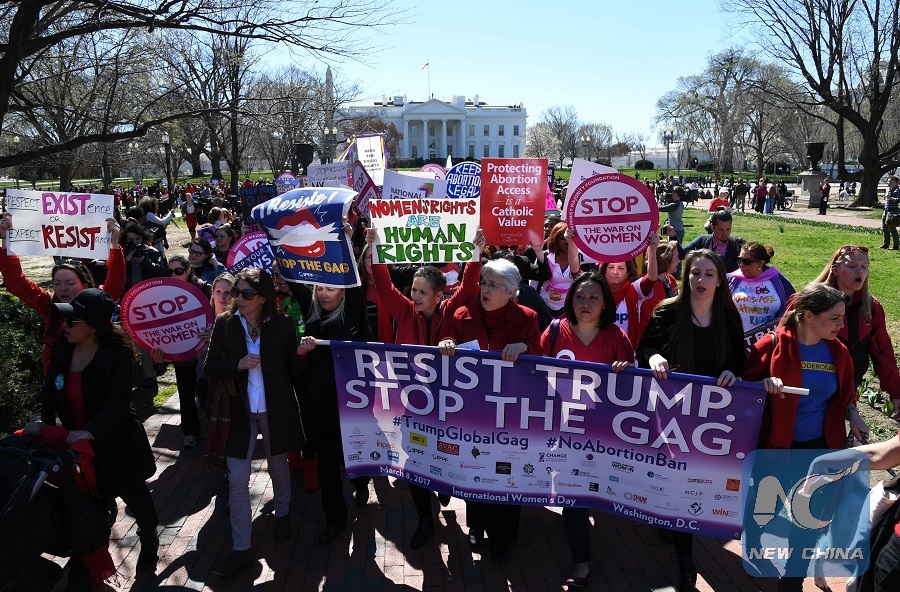
Hundreds of people attend a protest and march against U.S. President Donald Trump's global gag rule in Washington D.C., the United States, on March 8, 2017. In January, Trump signed an executive order -- the global gag rule, banning funding for American non-governmental organizations which support abortion initiatives worldwide. (Xinhua/Yin Bogu)
STRASBOURG, March 15 (Xinhua) -- Members of European Parliament (MEPs), meeting here for a plenary session on Tuesday, held a debate on the consequences of "global gag" rule reinstated by U.S. President Donald Trump.
Trump signed an executive order on Jan. 23 prohibiting U.S. financing of NGOs providing abortion or services such as counseling and training, even if they do so with their own money.
Trump's decision to reintroduce the ban has led to strong reactions around the globe. During the plenary debate, most MEPs criticized the U.S. decision, saying it could put women at risk as it might lead to more unsafe abortions.
Christos Stylianides, the European Commissioner responsible for humanitarian aid, said: "In the poorest countries of the world, this can put the lives of young women and girls at risk."
He added: "EU policies are driven by our own priorities and values, not by what others do or stop doing."
According to estimates from the World Health Organization, some 22 million unsafe abortions are carried out around the world every year, with a majority taking place in developing countries.
In 2008, 47,000 women are estimated to have died because of it. About five million women are admitted to the hospital every year as a result of unsafe abortions in developing countries and more than three million women who experience complications due to an unsafe abortion do not receive care.
"Cutting this funding does not mean fewer abortions. All the evidence from the last period when the gag was in place shows the number of unwanted pregnancies and abortions increased when the global gag came in," said British MEP Linda McAvan, chair of the development committee.
Some MEPs were also concerned that NGOs and clinics providing services of reproductive health will be affected and that the reduction in funding could have an impact on the health care being offered. They urged the EU to increase funding.
"We must condemn the U.S. gag rule, take up the fight in international fora and commit more money," Swedish MEP Malin Bjork said.
"The agenda of so-called populist parties is not just about nationalism, anti-EU or national sovereignty. It's also very much about sexism and misogyny, against women's rights," said Dutch MEP Sophie in't Veld.
"The EU must not only not accept standards imposed by third countries, but set the standards and fill the funding gap," she added.
"We are not talking about being for or against abortion; we are talking about humanitarian law. Health safety, child protection and women's rights are human rights," said Swedish MEP Anna Maria Corazza Bildt.
Europe should step in and show leadership, she added.
In response to Trump's decision, representatives from 57 countries and private organizations met in Brussels on March 2 for a conference organized by Belgium, Denmark, the Netherlands and Sweden to find ways to help the organizations affected.
The conference raised 181 million euros (191.9 million U.S. dollars) for fundraising initiative She Decides. Belgium, the Netherlands and Denmark are reported to have pledged 10 million euros, while Finland and Sweden committed to 20 million euros and Luxembourg to 2 million euros.
However, some MEPs argued that the rights of unborn children had to be protected and did not want the EU to fund these NGOs.
Slovak MEP Branislav Skripek called abortion "barbaric" with "no health care benefit," adding: "Resources should be redirected to provide real and maternal care to women."
French ENF member Marie-Christine Arnautu said there were people who tend to ignore national sovereignty.
"It's up to the U.S. government to decide on its own criteria when it comes to financing foreign NGOs," she said.
The "global gag" rule was first announced in 1984 in Mexico City during the UN International Conference on Population by then U.S. president Ronald Reagan who was in favor of "respect for human life at its most vulnerable -- human life still unborn".
Since its introduction, it has repeatedly been lifted by U.S. Democrats and reintroduced by Republicans.

